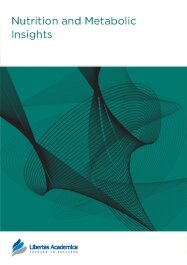

Publication Date: 31 Mar 2010
Type: Original Research
Journal: Nutrition and Metabolic Insights
Citation: Nutrition and Metabolic Insights 2010:3 15-23
doi: 10.4137/NMI.S3871

Background: Dietary Approaches to Stop Hypertension (DASH) has been shown to successfully reduce systolic (SBP) and diastolic blood pressure (DBP) when evaluated in clinically controlled environments but there is a lack of information regarding the efficacy of the original DASH diet when it is applied in a free-living environment.
Purpose: To provide descriptive data as to the changes in blood pressure individuals could expect to achieve when following the DASH diet in a free-living environment for 4-weeks with no additional behavioral modifications.
Methods: Twenty, pre- and stage 1 hypertensive participants were randomly split into 2 groups; DASH (males N = 5, females N = 5, age = 38.5 ± 10.8) and control (males N = 7, females N = 3, age = 38.1 ± 11.1). The DASH group was instructed on how to follow the DASH diet on their own for 4-weeks while the control group continued their normal diet. SBP, DBP, body weight, 3-day food diaries and physical activity recall questionnaire data were collected pre and post intervention using a traditional person-to-person instructional technique.
Results: Two-way ANOVA demonstrated that there was a significant group (DASH, control) by time (pre, post) interaction for SBP (P = 0.003) and no significant effects for DBP. The interaction was due to a significant reduction (P < 0.001) in SBP in the DASH group (pre: 141.3 ± 11.3 mmHg vs. post: 130.7 ± 9.1 mmHg) over the course of the intervention with no change in SBP in the control group (pre: 133.5 ± 6.6 mmHg vs. post: 131.9 ± 8.9 mmHg). Pearson’s correlation analyses revealed that changes in potential moderators of blood pressure including body weight, BMI, sodium intake and total kilocalories were each not associated with changes in SBP (r ≤ 0.14, P ≥ 0.5) or DBP (r ≤ 0.10, P ≥ 0.6) pre- to post-treatment. Chi-square demonstrated no significant differences in the number of participants per group (n = 4 DASH, n = 1 control) who indicated increasing physical activity during the intervention.
Conclusion: DASH diet followed in a free-living environment significantly reduced SBP but not DBP. However, the changes in SBP and DBP were very similar to those noted in controlled clinical feeding evaluations of the DASH diet. Presently, none of the potential moderators of blood pressure that were assessed were independently associated with the observed changes in blood pressure which may be due to our small sample size or the possibility that it is the combined change in multiple factors that lead to reductions in blood pressure when following the DASH diet.
PDF (586.87 KB PDF FORMAT)
RIS citation (ENDNOTE, REFERENCE MANAGER, PROCITE, REFWORKS)
BibTex citation (BIBDESK, LATEX)
XML
PMC HTML


We have had a great experience publishing our paper in Nutrition & Metabolic Insights. The peer review process was rigorous and the journal staff were very helpful with proof processing. We will definitely be submitting future manuscripts to this journal. Keep up the good work!!
Facebook Google+ Twitter
Pinterest Tumblr YouTube